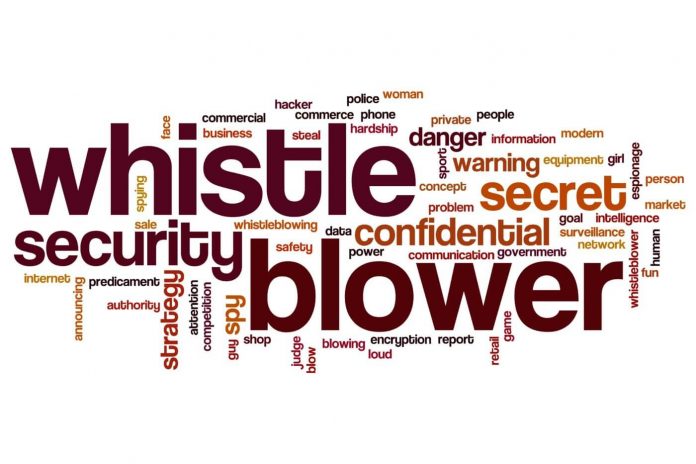This article is written by Shreya Malhotra, currently pursuing BBA LLB from Symbiosis Law School, Hyderabad. This article deals with the Right to Information and the Protection of Whistleblowers in India including the problems that exist in the structure of Whistleblowing.
Table of Contents
Introduction
The term “Whistleblowing” is used to describe conduct in which a person uncovers the details which are considered to be unlawful, immoral, or misconduct either to the public or within an organization. The whistleblower in India may be an existing or an ex-employee who reveals information about what is suspected to be corruption, wrongdoing, fraud, or violation from the company’s policies and laws. The Right to Information, provided by the Right To Information Act, 2005, has been an important weapon for whistleblowers in previous years to collect relevant data about any unlawful or immoral conduct and to make it available to the general public. The whistleblowers are capable of bringing to attention the administration’s fraudulent practices, using RTI as a weapon. Many of them are RTI activists whose goal is to bring transparency to the system. Such information could be used appropriately to bring social awareness about the work of authorities and can also be viewed as a function of redress for the individuals.
Towards the other side, such activists have encountered the impact of lack of security with the number of deaths of RTI Activists rising over the last decade. Therefore, a variety of issues are clearly visible within the current structure of information seeking and disclosure systems. Many people face a number of issues while finding information. One of the important reasons for these issues is that while the RTI is available to all, the whistle-blowers and information finders lack privacy. Numerous times they are bullied or perhaps even attacked by people because the information they are looking for can cause distress to the officials they are inquiring about. This may also contribute to the drastic action as eliminating truth-seekers such as the killings of Rajendra Prasad Singh in Bihar who revealed many unethical activities of local government’s police recruitment and health care policy, and the horrific death of Amit Jethwa who used RTI to reveal illicit mining in Gujarat’s Gir Forest. The final straw has been dealt out to this new group of whistle-blowers. While according to the Whistleblowers Protection Act, 2014, it is the responsibility of the government to determine that whistleblowers are shielded against victimization and hide their identity, this act has still not been operationalized so far.
Right to information and whistleblowers
Access to information wasn’t really straightforward for the individuals until the implementation of the Right to Information Act 2005. Due to a lack of information people could not participate in any of the discussions nor they could question the process of decision making even if they were suffering through it.
The Official Secret Act, 1923 acted as an artefact of British colonialism that covered everything in secret. The ordinary people had no legitimate right to inquire about public policy and spending. This was very odd that citizens who elected to control the parties responsible for policy formulation and contributing to the funding of public activities were refused access to important information.
The outcome of this culture of concealment resulted in the fertile growth of corrupt practices. Limitations to the free flow of information resulted in the development of feelings among the citizens such as lack of power and estrangement. Under these situations, the general populace and multiple nongovernmental organizations demanded more access to information controlled by the authorities. The government accepted the demands in the form of enactment of the Right to Information Act, 2015.
When the Right to Information Act was passed, it was bombarded as a significant step towards empowering civil society and trying to make the government more responsible and answerable. Transparency is the remedy to corrupt practices, and the more clear public organizations will become, the less scope for corrupt practices will be available.
People play an important role in exposing the corruption inside a corrupt system. By revealing wrongdoing in their companies these individuals take a major gamble. Taking the example of Satyendra Dubey, who was an honest and sincere whistleblower under the National Highways Authority of India (NHAI) and had given up his life.
This prompted the Supreme court to order a Central Vigilance Commission to safeguard the whistleblowers. The National Campaign for People’s Right to Information, the organization that played a very significant role in the RTI Act movement, demanded the Whistleblowers Protection Bill 2011 be passed swiftly.
Whistleblowers Protection Act, 2011 is an Act of the Parliament of India which gives a system to examine affirmed defilement and abuse of power by community workers and furthermore secure any individual who uncovered alleged wrongdoing in government bodies, activities, and workplaces. The malpractices or wrongdoings may appear as misrepresentation, defilement, or botch. The Act was endorsed by the Cabinet of India as a feature of a drive to kill defilement in the country’s administration and passed by the Lok Sabha on 27 December 2011. The Bill turned into an Act when it was passed by the Rajya Sabha on 21 February 2014 and got the President’s consent on 9 May 2014.
Analysis of Whistleblower Protection Act, 2011 & Whistleblower Protection (Amendment) Bill, 2015
The Whistleblowers Protection (Amendment) Bill, 2015 amends the Whistleblowers Protection Act, 2014.
The Whistleblower Protection Act, 2014 was sanctioned to empower any individual to unveil to a Competent Authority, demonstrations of defilement or wilful abuse of power or discretion, or criminal offences by a government employee. The Competent Authority is the Prime Minister or the Chief Minister on account of Ministers, the Speaker or Chairman for Members of Parliament or state law-making bodies, the Chief Justice of the High Court for district court judges, and the Central or State Vigilance Commission for government workers.
The Bill alters this arrangement to deny an individual from uncovering data related to corruption or other wrongdoing by public servants in the event that it falls under 10 classifications. These classifications incorporate data related to the sovereignty, scientific, economic premiums and security of India, proceedings of the Council of Ministers, breach of the benefit of law-making bodies, intellectual property, an examination procedure, and so forth.
The Statement of Objects and Reasons in the Bill of 2015 expresses that the disallowed classes have been demonstrated on the 10 classifications of information that can’t be uncovered under the Right to Information (RTI) Act, 2005. Be that as it may, this comparison may not be adequate. The motivation behind the RTI Act is to make data with public authorities available to all individuals so as to advance straightforwardness and responsibility. There might be conditions where it may not be attractive for public institutions to uncover all variety of information to all the individuals or citizens.
Interestingly, the Whistleblowers Act accommodates defilement related data to be given by a person to a Competent Authority. The Competent Authority, in all cases, is an elevated level Constitutional or legal position. This data isn’t made open and the investigation into the charge is required to be discreet, with the identity of the complainant, public servant, and related records being left well enough alone.
It should be noted that the RTI Act allows the adequate public authority to unveil the information or data: (I) that falls under the 10 classifications of precluded data in the Act, and (ii) information denied under the Official Secrets Act 1923 if the public interest for uncovering data exceeds the damage done to secured interests. Further, while the Act rejects 22 security and intelligence associations from its domain, any data identified with charges of defilement must be given. Additionally, the Act permits a two-phase procedure to appeal against a decision to retain the requested data or information. The Whistleblower (Amendment) Bill 2015 doesn’t have any such arrangements.
The Statement of Objects and Reasons of the Bill expresses that at the hour of the section of the Whistleblowers Protection Act 2014, the legislature had coursed certain alterations. Be that as it may, as the Bill was taken up for discussion on the very last day of the 15thLok Sabha, the changes were not moved. The 2015 Bill currently looks to carry forward those revisions.
The 2013 proposed alterations precluded just two classes of data from being unveiled under the Act: (I) that identified with sovereignty, logical, scientific or financial interests of India, foreign terms, or the persuasion of an offence; and (ii) proceedings of the Council of Ministers. Be that as it may, the 2015 Bill restricts the unveiling of 10 classes of information.
In the Act, the technique to decide restricted disclosures isn’t material as the Act doesn’t preclude any kind of information from being uncovered. Then again, the Bill gives, once a disclosure is made the competent authority will allude it to an authorized authority of the government. The said authority will take an official decision on whether the revelation is prohibited.
With respect to the issues that may not be uncovered during an investigation into a whistleblowing protest the Act expressed that once a whistleblowing grievance is conceded, and is being inquired into, no individual is required to give any information if it falls under five classifications: I) security of the country, ii) foreign relations; iii) public order and morality; iv) contempt of court; criticism, persuasion to an offence; and v) Cabinet proceedings. Then again, the Bill says, the five classes are replaced with the over 10 classifications of information.
According to some views expressed that the Bill is being utilized to weaken the impact of the Act. Due to the expansion to the conditions where the information doesn’t need to be revealed, it is felt that the Amendment is detracting from the viability of the original Act.
Dying for information
Right to Information (RTI) activists have been murdered since 2005, while 6 have ended it all by committing suicide, as stated by the Commonwealth Human Rights Initiative. There is no law to ensure activists or to keep their personal information from falling into inappropriate hands. The revised Whistleblower Protection Bill has been stuck down in Parliament since 2015.
On March 20, 2018, a 38-year old Poipynhun Majaw was murdered in the wake of getting various massive blows from a wrench to his head in Meghalaya’s East Jaintia Hills region, a conspicuous mining region wealthy in coal and limestone. The intention behind his demise is likely attached to his investigation concerning the game plans between the leaders of the Jaintia Hills district council and cement manufacturing companies.
Majaw’s demise, while deplorable, wasn’t unexpected. The Right to Information (RTI) activist uncovered a year ago that the district council had permitted cement organizations to mine in the zone without satisfactory licenses. As the leader of the Jaintia Youth Federation, a social dissident gathering, for a long time, he rallied the area’s youth around various issues, for example, constituent misrepresentation and nature harm from business exercises.
In the same way as other activists and columnists in the nation who have utilized the RTI law to uncover wrongdoings, Majaw was an exposed target. There was no satisfactory law to ensure him or to protect the personal information on his RTI application from falling into inappropriate hands.
The Right to Information Act, India has been positioned seventh-best in the world as far as quality as indicated by the Center for Law and Democracy, permits Indian residents to demand data from public institutions and the administration.
Since October 2005, when the RTI Act was executed, more than 85 activists and whistleblowers have been killed in India, as indicated by a tracker set up by the Commonwealth Human Rights Initiative (CHRI). An extra 164 activists have reported harassments and assaults while 180 have been threatened. A significant part of these activists had practised this privilege and requested data, just to be harassed and at times, quieted for all time.
Around 68% of the passings are by and large homicides, while the rest have been governed by suicides. John Mascrinaus, an information examiner at the CHRI, says that 16 of these homicides have occurred in Maharashtra, 12, and eight have happened in Gujarat and Karnataka, individually, while six each have occurred in Bihar and UP.
The capacity to practice one’s entitlement to data is a basic component of democracy and ought to be protected. The personal details of RTI applicants should be kept secure. The mysterious filing of RTI applications ought to be empowered.
There should be a law to safeguard the whistleblowers. The altered Whistle Blowers Protection (WBP) bill has been slowed down in the upper house of India’s Parliament since 2015. This outdated Act prohibits the unveiling of insider secrets. In its endeavour to preserve data that identifies with national security, which the RTI act denies applicants from acquiring in the first place, the administration is compromising with the personal security of its residents. The proposed alterations to the WhistleBlower Protection act should be pulled back.
At long last, the administration specialists need to make a superior showing of revealing data at the national, state, and region level. A section of the RTI act requires the “willful exposure of data” by authorities. This incorporates all data identified with government plans and permits to operate.
Out of the complete number of RTIs filled, estimated at 24.9 million by CHRI, a lion’s share is denied for reasons, for example, an “absence of data”, raising doubt about the motivation behind the act itself. The legislature has the duty of guaranteeing the security of RTI applicants so the act can keep on being utilized to advance straightforwardness, check defilement, and at last, improve this country.
Famous cases of whistleblowers in India
India is the biggest democracy in the world and the absolute greatest associations are overseen by Government authorities. In India, the law is frequently utilized to exploit individuals. There are hardly any fearless people left, who take a stand against wrongdoing. Here are some fighters, the ‘whistleblowers’ who sacrificed their lives battling against the unlawful and degenerate framework.
Three informants who disentangled Vyapam Scam
Despite the fact that the malpractice in Madhya Pradesh Professional Examination Board (MPPEB) known as Vyapam in Hindi has been going on for a considerable length of time as the main objection came in 1995 and in 2000 the first FIR was recorded. Vyapam conducts a series of competitive examinations on a large scale for admission to different expert courses and for enrolment in government services. The Vyapam scam included conspiracy among test competitors, government authorities, and brokers who helped undeserving applicants get excellent grades and secure government occupations.
In 2013, three men, Prashant Pandey, 36, a digital forensic engineer with a two-year experience working with enforcement agencies in Madhya Pradesh, Dr. Anand Rai a clinical official with a Government hospital in Indore and 26-year old Ashish Chaturvedi, a student of social work in Gwalior broke a gigantic scam in July 2013 in which 20 individuals were arrested from various hotels in the city. By June 2015, in excess of 2000 individuals had been captured regarding the scam. Various individuals who were by one way or another identified with the scam have died in speculated conditions and three activists who disclosed the scam have likewise confronted different dangers and have been given protection. On 13 February 2017, the Supreme Court of India conveyed an 83-page judgment and dropped the degrees of 634 specialists.
Golden Quadrilateral Project case
Satyendra Dubey joined Indian Engineering Service (IES) and in 2002, he turned into the Project Director in the National Highway Authority of India (NHAI) at Koderma, Jharkhand. The Indian Government led by Atal Bihari Vajpayee initiated an enormous Golden Quadrilateral Project undertaking to link all major Indian cities through four and six-lane highways and Satyendra Dubey was answerable for dealing with a segment of NH-2 (GT Road). He found that a contracted firm Larsen and Toubro had taken a contract from the Indian government and passed it on to smaller contract mafias who were incapable for taking care of such an enormous scope project.
He also noticed that, while constructing the roads, standard method and quality was not maintained. He chose to write to his high-ranking NHAI authorities, and he wrote directly to the PM Atal Bihari Vajpayee when he failed to get a proper answer from the NHAI authorities. He pleaded for his name to be kept confidential however the letter along with his profile information was sent to the Ministry of Road Transport and Highways. In 2003, he was murdered in Gaya, Bihar while returning from a wedding in Varanasi. A special CBI court headed by Raghvendra Singh found 3 accused guilty and they were sentenced to life imprisonment.
Indian Oil Corporation case
In this case, M. Shanmugam, who was an Indian Institute of Management graduate, while he was working in the Indian Oil Corporation Limited, he was murdered for sealing 2 petroleum stations for selling defiled fuel in Lakhimpur Kheri, UP. At the point when the petrol pump started working again, he led an unexpected raid following a month, to check the quality of fuel. In 2005, he was shot with six bullets and his dead body was found in the backseat of his vehicle. This news caused a massive outcry in the nation as well as the media. The Trial Court found all accused guilty and all the 8 accused were convicted, while one of the accused was sentenced to death and rest of the 7 were given life imprisonment. However, the High Court changed the decision for the accused who was provided with death sentence to life detainment and also acquitted 2 accused. In 2015, the Supreme Court maintained the life imprisonment granted to six men.
Government responses
The Government agencies, mainly the Ministry of Rural Development (MoRD), the Central Information Commission (CIC), and the National Human Rights Commission (NHRC) took constructive, although minimal, action to handle retaliations related to Right to Information.
In the month of May 2013, the Ministry of Rural Development issued a memorandum in order to respond to three deaths relating to RTI in Bihar to investigate complaints relating to MGNREGA with other initiatives and also to guarantee the protection of whistleblowers (Hindustan Times 2013).
The memorandum claimed that in the situation where there is the use of force, coercion, and other related acts against whistleblowers, the state governments would ensure the Immediate commencement of judicial proceedings and provide the necessary protection. While this guideline has not been issued by the government, it would be the first guideline of its type to shield whistleblowers.
Coming on to the Whistleblowers Protection Act, 2014 even though in May 2014, the Centre notified the Whistleblowers Protection Act, 2014, it told Parliament earlier that the Act required alterations in order to protect against disclosures which may have consequences for national security. To which the Centre presented the Whistle Blowers Protection (Amendment) Bill, 2015, approved in May 2015 by the Lok Sabha. Yet the bill’s amendment has not been cleared in Rajya Sabha and expired before the general elections in 2019 when the 16th Lok Sabha was dissolved. The government then told the Lok Sabha that the structure of existing legislation is deemed adequate to provide all the citizens, including RTI activists, with safety and protection.
The Central Information Commission is the main appellate body that listens to disputes relating to Right To Information. Its requirement is confined to aiding access to the information which is either purposely denied or retained for no rational reason. In cases where it is cognizant of violent acts against RTI user groups, it lacks the power to inquire, inspect, or prosecute offenders.
That being said, in 2011, the Central Information Commission cleared up that if it receives any complaint concerning an assault or murder of an information seeker, CIC will then evaluate the victim’s awaiting RTI requests and request the depts concerned to release the requested information promptly on their webpage in accordance with the provisions of law.
Subsequently, in a homicide case from Maharashtra, the department concerned released the information sought by the victim on its webpage, as per the instructions of the chief information commissioner. This strategy could lessen the risk of using violence and bullying to prevent information from being public.
The mission of the National Human Rights Commission is to safeguard the human rights of all the citizens, protected under the Indian Constitution, and represented in international treaties and conventions. The NHRC has noted RTI based retaliation and has identified RTI users as guards of human rights.
It started a helpline and managed to reach out to state governments and police agencies to make inquiries relating to repressive cases. In 2011, the NHRC took the proactive step of writing to the police superintendent of Bihar to make inquiries about a murder pertaining to RTI. Although its powers are specific, the NHRC plays a prominent role in highlighting matters, summoning officials from the government, and guaranteeing compensation.
Problems that exist in the Indian whistleblowing structure
An informant, who uncovered the wrongdoings of the authorities without hurting its national security for Public Benefit should remain anonymous.
These Whistle-blowers, who look for data through the RTI need to give their basic identity to get the information. A typical pattern between the RTI Whistle-blowers is that they’re generally government employees that are attempting to fight the corrupt administration in our nation. When they notice any error or fraud in the public administration circle, they bring it out into the notice of the general public through the media sources or internet-based sources to bring issues to light.
This is the place the difficulty lies, as the Whistle-blowers who’ve uncovered the administration haven’t put the security of our nation in danger yet it’s their lives that are in harm. Because of the nature of the RTI, it’s simple for the ones that have been charged here to follow the activists. When this occurs, they get dangerous calls and their families and lives are at a steady hazard because of the influence of the authorities.
This shows the deficiency of the enactments as, despite the fact that India has followed through the Whistleblower Protection Act, it crushes the goal of what the Right to Information act focused on. The RTI needs to advance straightforwardness in the administration of our country. The laws work in segregation however are crushed when informants who look for the cure through them lose their life as the framework neglects to perceive these activists in any case and treats them as a normal information finder.
Suggested measures/recommendations for the protection of the whistleblower
When compared with the United States or the European Union, whistleblowing is still considered to be a work under construction in India. And so, in order to become more effective, the law needs to be more stringent and so it is in need of modifications. Although passing laws is a significant initial step, however, India must accomplish more to successfully safeguard whistleblowers and build an institutional system for battling wrongdoings.
Here are some recommendations-
- The RTI should work with the Whistleblowing Protection Act in order to establish detailed guidelines on the basis of which a request for information can be rejected on the grounds of national security. However, when it happens to come to the whistleblower protection laws, they refuse to look at it from the Whistle-blower point of view. It is clearly the State’s responsibility to realize the equilibrium between what is to be deemed as national security and a whistleblower’s life and to incorporate policies that promote a harmonious relationship between its security and whistleblowing legislation.
- The Whistle-blower Protection Act needs to determine a rational system by which a whistleblower can explain his problems to the current system and deal with them. At the very same time, based on political benefits or impacts, the system should not dismiss the information given by a Whistle-blower.
- A significant enhancement to the RTI Act will be to recognize Whistle-blowers who specifically disclose public service irregularities and provide them with formal assistance. Protecting their secrecy and delivering Whistle-blower Protection Services to them would be essential in enhancing the Act.
- It is equally important to understand whistle-blowers do not fall within the lines of regular killing or harassment, as the attacks they encounter are often conservative to the duty they are obligated to do. That’s where the law system fails because it refuses to acknowledge the history of the case and most rules in lieu of the accused because of circumstantial proof or the remoteness of the cause.
- Even the police officers, too, should be prepared and briefed on the essence and implications of whistleblowing and should provide appropriate safeguards to safeguard all who receive security from them.
- The Act offers assurance for activities taken in accordance with some basic honesty just to the Competent Authority and not to the informant. It is prescribed that such assurance be stretched out to the informant, and his real expectations ought to be set up by an application of a sensible belief test.
- Considering the term ‘victimization’, the Act gives a close-to-nothing definition covering just the initiation of any proceedings or otherwise only on the ground that a revelation was made, or help was rendered under the Act. It is suggested that a far-reaching definition ought to be included in the Act and should contain a comprehensive explanation of the sort of victimization that the Act offers security against.
- Under Section 17, the Act accommodates punishment on account of bogus and negligible disclosure. Correspondingly, prizes could be paid if and when the substance of revelation is demonstrated, and an imperative move is made and could appear as monetary motivating forces. The Whistleblower Act, 2006 (Ghana) builds up an undeniable ‘Informant Reward Fund’ and accommodates a prize to the informant if the revelation prompts the capture and conviction of the blameworthy.
Conclusion
When somebody puts society in danger, then society does have the right to know regarding it. Whistleblowing is an act that requires massive strength and it is done by some of those individuals whose soul doesn’t really permit them to stay quiet and to maintain a dim view of others’ misdeeds. Via exposing corruption or any other type of wrongdoing that occurs in damage to the individual, all types of whistleblowing safeguard the society, foster the greater interest, and enhance the law and order. This is why their safety is of paramount importance and at least their safety must be guaranteed to them.
Having a look towards the other side though whistleblowing is also an important component of a healthy society. But where there are severe consequences on global defence, confidentiality and anonymity can justifiably be contended, as then it would be in the broader interest of the public not to reveal or circulate such issues. Therefore, the two competing priorities of government openness and public protection will be needing a delicate balance. The government should now need to pass the Whistleblowers Act and develop a solid regulatory regime to safeguard whistleblowers in order to sustain this balance.
References
- http://www.rtifoundationofindia.com/when-shall-whistleblowers-protection-act-be-implem#.XvYVDCgzZPZ
- http://www.conventuslaw.com/report/india-scraping-the-amorphous-contours-of/
- http://www.iosrjournals.org/iosr-jhss/papers/Vol19-issue4/Version-7/A019470109.pdf
- https://www.mondaq.com/india/whistleblowing/433216/the-whistleblowers-protection-amendment-bill-2015
- http://www.ijetmas.com/admin/resources/project/paper/f201503031425430684.pdf
- https://www.pwc.in/assets/pdfs/services/forensic-services/whistleblowing-aneffectivemeanstocombateconomiccrime.pdf
- https://www.u4.no/publications/dying-for-information-right-to-information-and-whistleblower-protection-in-india/
- https://knowledgeofindia.com/list-of-whistleblowers-in-india/
- http://rsrr.in/2020/01/13/whistleblowing-rti-tshwane/
LawSikho has created a telegram group for exchanging legal knowledge, referrals and various opportunities. You can click on this link and join:
 Serato DJ Crack 2025Serato DJ PRO Crack
Serato DJ Crack 2025Serato DJ PRO Crack












 Allow notifications
Allow notifications


